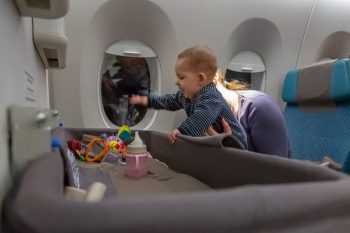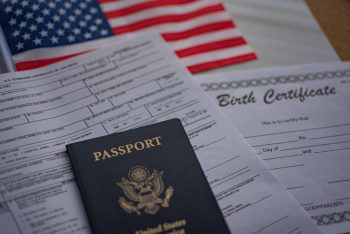Are you a parent eagerly awaiting that much-needed vacation or planning a visit to meet family and friends?
The thought of traveling with your baby might be both exciting and daunting, especially if you’re wondering, “How young can a baby fly?”
As a parent, you want to ensure your baby’s safety, comfort, and well-being throughout the journey.
In this comprehensive guide, we’ll address your concerns and provide valuable insights to help you plan a stress-free flight with your little one.
Understanding the Ideal Age for Flying with a Baby
The ideal age for flying with a baby can vary, but many experts recommend waiting until your baby is at least 2 to 3 months old before taking their first flight.
By this age, your baby’s immune system is more developed, and they may have received some initial vaccinations, which can offer them added protection during air travel.
However, it’s important to note that every baby is unique, and consulting your pediatrician before making any travel plans is crucial.
Your doctor can provide personalized recommendations based on your baby’s health and developmental stage.

Tips for a Comfortable and Safe Flight
1. Choose the Right Time: Opt for flights that align with your baby’s sleep schedule. A well-rested baby is more likely to remain calm during the journey.
2. Pack Essentials: Pack enough diapers, wipes, formula or breast milk, baby food, and a change of clothes. Having these essentials on hand can make a significant difference during unexpected delays or turbulence.
3. Seating Arrangements: When booking your flight, consider reserving a bassinet or a seat with extra legroom. These options can provide a more comfortable space for you and your baby.

4. Health Precautions: Carry a small first-aid kit with baby-safe essentials. Additionally, follow recommended hygiene practices, such as sanitizing hands and surfaces, to minimize the risk of exposure to germs.
5. Feeding and Ear Pressure: Breastfeeding or offering a pacifier during takeoff and landing can help alleviate ear pressure discomfort for your baby.
6. Dress Comfortably: Dress your baby in layers for easy temperature regulation. Also, choose comfortable clothing for yourself, as you may need to hold your baby for extended periods.
Navigating Airport Security and Regulations
Airport security procedures can be intimidating, but knowing the rules and being prepared can streamline the process:
1. Documentation: Ensure you have all necessary documents for your baby, including their birth certificate, any required travel visas, and a copy of their immunization records.

2. Baby Gear: Strollers, car seats, and baby carriers are generally allowed through security and can be checked at the gate. Familiarize yourself with the airline’s policies before you travel.
3. Liquids and Baby Food: You’re allowed to carry baby formula, breast milk, and baby food in reasonable quantities exceeding the typical 3.4-ounce liquid limit. Inform security officers, and they may perform additional screening.
Booking a Baby-Friendly Flight
When booking your flight, consider airlines that offer baby-friendly amenities and policies:
1. Family Boarding: Many airlines offer early boarding for families with young children. This allows you to settle in and organize your belongings without the rush of general boarding.

2. In-Flight Facilities: Some airlines provide changing tables in restrooms and may even offer baby-friendly entertainment options.
3. Seat Selection: Look for airlines that allow you to select seats in advance, giving you the opportunity to choose the most suitable seating arrangement for your family.
Managing Jet Lag and Time Zone Changes
Traveling across time zones can disrupt your baby’s sleep schedule. To help your baby adjust:
1. Gradual Adjustment: A few days before your trip, gradually adjust your baby’s sleep and feeding times to align with the destination’s time zone.
2. Exposure to Natural Light: Once you’ve arrived, spend time outdoors with your baby to help reset their internal body clock.
3. Be Patient: Understand that it might take a few days for your baby to fully adapt to the new time zone. Be patient and allow for flexibility in your plans.
Traveling with a baby can be an enriching experience, allowing you to create lasting memories together.
By considering your baby’s age, health, and following these expert tips, you can ensure a safe and comfortable journey for both you and your little one.
Remember, preparation is key, so plan ahead, communicate with your airline, and consult your pediatrician to make the most of your upcoming adventure.
Embark on your travel journey with confidence and enjoy the precious moments that come with exploring the world with your baby by your side.


